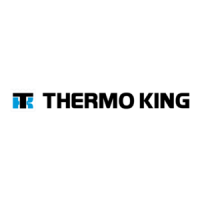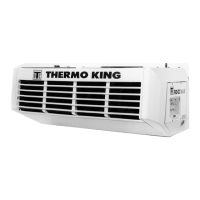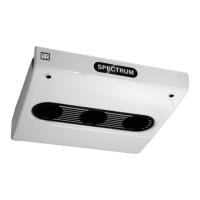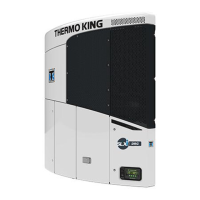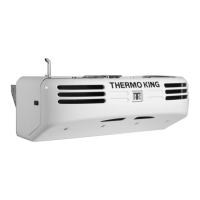Do you have a question about the Thermo King RD-II SR 30 EEC and is the answer not in the manual?
General safety guidelines for operating and servicing the unit.
Safety precautions related to the unit's automatic start and stop functions.
Guidelines and first aid for safe handling of refrigerants.
Critical safety precautions when working with high voltage components.
Precautions for handling refrigeration oil and associated first aid.
Safety considerations for low voltage circuits and potential hazards.
Detailed technical specifications for the unit's engine.
Guidelines for setting and checking belt tensions on various components.
Specifications for R-134a and R-404A refrigeration systems.
Specifications for the unit's electrical control system components.
Specs for electric standby, power, and air switch.
Scheduled maintenance tasks for the engine.
Scheduled maintenance tasks for the electrical system.
Scheduled maintenance tasks for the refrigeration system.
Scheduled maintenance tasks for structural components.
Overview of the RD-II SR unit, its models, and general features.
Components and functions of the µP-T microprocessor control system.
Standard and optional features for Model 50 units.
Description of unit instruments, displays, and remote indicators.
Description of various protective devices for the unit.
Procedures for unit operation, including startup and self-checks.
Steps for performing a pre-trip inspection before unit operation.
Procedure for conducting a full unit self-check test.
Steps for restarting the unit after a shutdown.
Steps to perform after the unit has started to confirm proper running.
Steps for loading cargo after the unit is ready.
Procedures for post-load checks and after-trip checks.
General overview of the µP-T microprocessor control system.
Detailed breakdown of the µP-T control system parts.
Description of standard and optional electric standby features.
Explanation of the remote control panel keypad keys and their functions.
Description of the remote control panel display and its normal display.
Meanings of various icons shown on the unit display.
Detailed explanation of each keypad key's function.
Meanings of Alarm, Electric, and Setpoint icons on the display.
Function of Whisper icon and how to read the display.
Description of the standard display when the unit is turned on.
Step-by-step instructions for changing the unit's setpoint.
Procedure for selecting operating modes.
Instructions for starting the unit's engine.
How to manually start a defrost cycle.
Procedure to check the unit's software revision.
How to view different screens and prompts on the display.
Detailed explanation of viewing various screens and prompts.
How to lock a specific display screen.
How to view and clear alarm codes displayed by the unit.
Information about µP-T alarms, codes, and types.
Explanation of the µP-T Unit Self Check test.
How to interpret the results of the Unit Self Check.
Information on alternators, regulators, and charging system diagnostics.
General safety precautions for electrical maintenance.
Causes of excessive voltage and battery maintenance.
Inspection of unit wiring, harnesses, and electrical contacts.
Details on charging system and RPM sensor function.
Procedure for testing the RPM sensor.
Function and testing of glow plugs.
Checking fan rotation for electric standby operation.
Procedure for checking and adjusting the defrost air switch.
Details on air switch calibration and adjustment.
Description and operation of the high capacity heating system.
Description of cool mode and heat/condenser evacuation mode.
Details on engine oil, filters, and lubrication system.
Procedure and schedule for changing engine oil and filter.
Description of oil bath and dry type air cleaners.
Description of the engine's cooling system.
Procedures for checking and changing engine antifreeze.
General procedures for antifreeze maintenance.
Procedure for bleeding air from the engine cooling system.
Information about the engine thermostat.
Description of the engine's fuel system components.
Procedure for bleeding air from the fuel system.
Potential issues caused by water in the fuel system.
Procedure for replacing the fuel filter.
Information on the electric fuel pump.
Procedures for adjusting the engine's injection pump.
How to time the injection pump to the engine.
Identification and use of timing marks on the engine.
Procedure for timing individual engine cylinders.
Procedure for adjusting engine valve clearance.
Information regarding the fuel limit screw and regulations.
Description of the engine mounting system components.
Details of the RD-II idler assembly.
Information on the automatic start/stop feature.
Procedures for adjusting engine/compressor belt tension.
Tensioning and adjustment of various drive belts.
Description of the integral fuel solenoid.
Operation of the TK 3.95 engine.
Procedures for diagnosing and replacing the fuel solenoid.
Procedures for adjusting engine speed.
List of parts for the integral fuel solenoid.
Comprehensive procedures for evacuating the refrigeration system.
Importance of evacuation for system performance and detailed principles.
How to set up and test evacuation equipment.
Step-by-step procedure for evacuating the unit.
Step-by-step process for charging the refrigeration system with refrigerant.
Methods for detecting refrigerant leaks.
Procedures for testing refrigerant charge levels.
Procedures for checking the compressor oil level under different conditions.
Testing refrigerant charge with a loaded box.
Testing the high pressure cutout.
Performing compressor pump down and checkout.
Description of the three-way valve's bypass check valve function.
Procedure for repairing the three-way valve.
Procedures for removing and installing accumulator and compressor.
Removal and installation of coils, check valves, and dehydrator.
Removal and installation of expansion valve and heat exchanger.
Procedures for high pressure switches and pilot solenoids.
Removal, installation, and repair of receiver tank.
Removal, installation, and repair of three-way valve.
Details on R-134a and R-404A refrigerants and unit identification.
Recommended equipment for working with these refrigerants.
Information on the refrigerant recovery system, "The Collector".
Procedures for throttling valve removal, repair, and reassembly.
General inspection and maintenance procedures for the clutch.
Step-by-step instructions for clutch disassembly and reassembly.
Procedures for installing clutch bearings and seals.
Checking unit and engine mounting bolts and performing unit inspections.
Procedures for cleaning coils and positioning the fan assembly.
How to check and adjust the defrost damper.
Procedures for disassembling and reassembling the jackshaft assembly.
Steps for overhauling the fanshaft assembly, including bearings and seals.
Procedure for installing the RD-II SR idler pulley seal.
Troubleshooting for engine not starting, cranking issues, and stopping after start.
Troubleshooting for engine not reaching full power and excessive smoke.
Troubleshooting causes and remedies for engine knocking and overheating.
Troubleshooting low oil pressure, consumption, and related engine problems.
Troubleshooting white/blue smoke indicating engine issues.
Troubleshooting battery not recharging problems.
Troubleshooting for electric motor not running or humming.
Troubleshooting contact chatter, welding, freezing, and heater problems.
Troubleshooting rapid cycling, pressure variations, and unit operation modes.
Diagnosing issues with expansion valves, lines, and refrigerant flow.
Troubleshooting faulty valves, solenoids, and electrical connections.
Diagrams illustrating cool, condenser, and heat/defrost cycles.
| Power Supply | Diesel engine and electric standby |
|---|---|
| Refrigerant | R-404A |
| Weight | Approximately 1, 200 lbs (544 kg) |
| Dimensions | Varies depending on configuration; typically around 75" H x 45" W x 40" D (1905 mm x 1143 mm x 1016 mm) |
| Fuel Type | Diesel |
| Cooling Capacity | 3, 000 BTU/h |
| Refrigeration Capacity | 3, 000 BTU/h |
